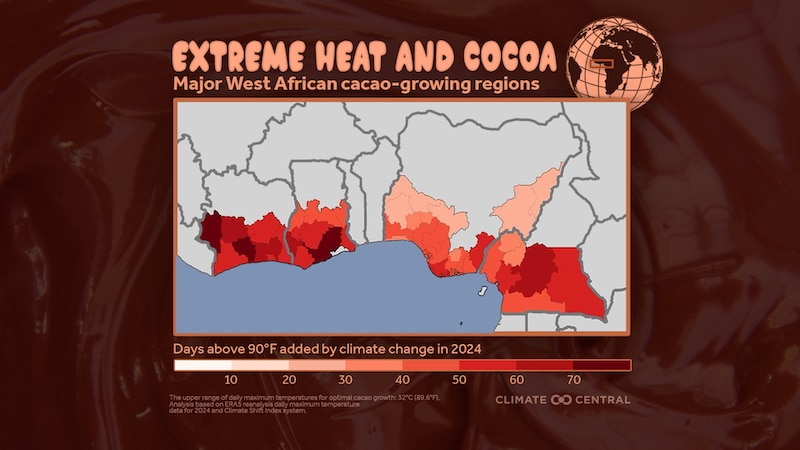This post was originally published on Eco Watch
According to a new report by independent research group Climate Central, the climate crisis has driven weeks of hot temperatures in West Africa’s “cocoa belt,” where roughly 70% of the cocoa in the world is produced, impacting harvests and likely causing record chocolate prices.
Between July of 2022 and February of last year, cocoa prices jumped by 136 percent, partially due to climate extremes in the region, a press release from Climate Central said.
“Climate change, due primarily to burning oil, coal, and methane gas, is causing hotter temperatures to become more frequent in the four West African countries responsible for producing approximately 70% of the world’s cacao — the key ingredient in chocolate,” the report, Climate change is heating up West Africa’s cocoa belt, said. “While many factors, such as precipitation and insect-borne infections, can affect cacao trees, excessive heat can contribute to a reduction in the quantity and quality of the harvest — potentially increasing global chocolate prices and impacting local economies in West Africa.”
Climate change is melting our relationship with chocolate
In 2024 alone, human-caused climate change added 6 extra weeks of heat stress above the ideal temperature in many cacao-growing regions.
More from a new Climate Central attribution science report
www.youtube.com/shorts/eyKOk…— Climate Central (@handle.invalid) February 12, 2025 at 2:05 PM
The bean pods of the cacao plant are used to produce cocoa, and they thrive under specific ranges of rainfall and temperature. Warm to hot temperatures as high as 90 degrees Fahrenheit are best for cacao growth, but any higher and the quantity and quality of the harvest can be affected.
The analysis looked at how human-caused climate change has impacted the frequency of the cocoa belt’s daily maximum temperatures over the past decade (2015 to 2024).
The study focused on 44 of the major cacao-growing regions in the top four cocoa-producing countries: Ghana, Côte d’Ivoire, Cameroon and Nigeria. Other major producers of cocoa include Brazil, Chile, Peru, Indonesia and Ecuador, but they were not included in the analysis.
Climate change had the largest impact on cacao-growing regions in Ghana and Côte d’Ivoire — two countries which produce more than half the world’s cocoa, supporting millions of workers and farmers’ livelihoods. In both these countries, an average of roughly 40 days of daily maximum temperatures higher than 90 degrees Fahrenheit were added in the past 10 years due to climate change.
Nigeria and Cameroon saw an average of 14 and 18 more days, respectively, of cacao-limiting heat each year due to global heating.
Most — 28 of 44 — of the areas analyzed in the study experienced a minimum of six extra weeks of heat that limited cacao growth annually.
“Growing cocoa is a vital livelihood for many of the poorest people around the world and human-caused climate change is putting that under serious threat,” said Osai Ojigho, policy and public campaigns director at Christian Aid, as The Guardian reported.
Changing rainfall patterns can put additional strain on cacao growth, Climate Central said. Well-distributed and adequate rainfall is necessary for cacao plants, which do best in areas with yearly rainfall totals from 59 to 79 inches and with dry spells that last three months or less.
Much of the annual variation in cocoa production can be attributed to rainfall fluctuations. Climate change is predicted to increase frequent and/or large transitions between very wet and very dry conditions in many parts of the globe, including in West Africa, which could potentially affect cocoa production. Last year’s worldwide cocoa price increase was caused by inconsistent rainfall patterns.
Since late 2023, failed cacao harvests have contributed to a major jump in cocoa prices on the New York and London markets where cocoa is traded, reported The Guardian.
On Wednesday, cocoa prices on the New York exchange had soared to over $10,000 a tonne after a mid-December peak of more than $12,500. For decades, New York prices have mostly been steady at $2,000 to $3,000 per tonne.
Swiss chocolatier Lindt & Sprüngli said in January that it would raise prices once again to offset the rising cost of cocoa.
Future threats to cocoa production also include smuggling, illegal mining and cacao swollen shoot virus, which impact the quality and quantity of cacao harvests, creating added challenges for farmers and driving up the price of chocolate.
Heat above 90 degrees Fahrenheit not only limits chocolate production, but is dangerous for the farmworkers who harvest cocoa.
“Extreme heat compounds other dangerous and physically-demanding working conditions, including exposure to chemicals, lifting heavy loads, and long hours. Many cocoa farmers make less than $1 equivalent per day and are older adults or children — both groups that are at higher risk of heat-related illness,” the press release said. “Since about 90% of cocoa is produced by small-scale operations, the changing climate is a significant factor that directly harms the lives and livelihoods of cocoa farmers.”
Adaptations — including breeding more heat- and drought-resistant plants, shading cacao plants with taller trees and shifting production to locations that are likely to have more suitable future conditions — can help farmworkers cope with changing climate conditions, but can’t fully prevent the disruptions and challenges of cocoa production.
According to Narcisa Pricope, a geosciences professor at Mississippi University, cacao is facing an “existential threat” largely due to cacao-producing regions’ increasingly dry conditions.
Pricope said the biggest factor in the aridity was greenhouse gas emissions.
“Collective action against aridity isn’t just about saving chocolate – it’s about preserving the planet’s capacity to sustain life,” Pricope said, as The Guardian reported.
The post Climate Crisis Is Causing a Chocolate Market Meltdown: Study appeared first on EcoWatch.






0 Comments